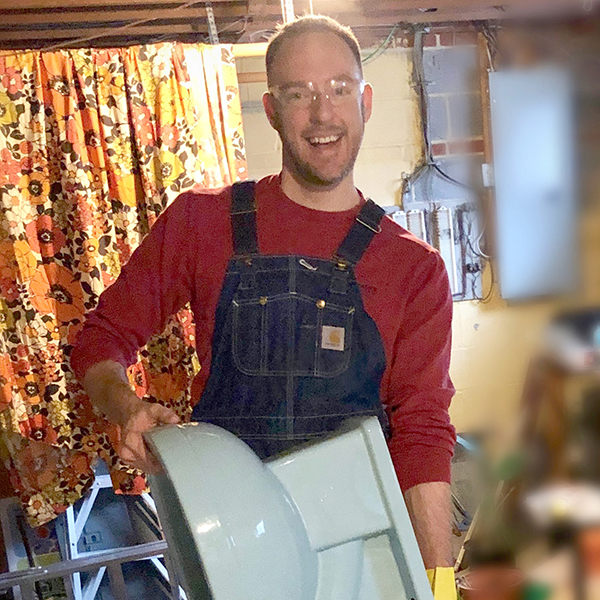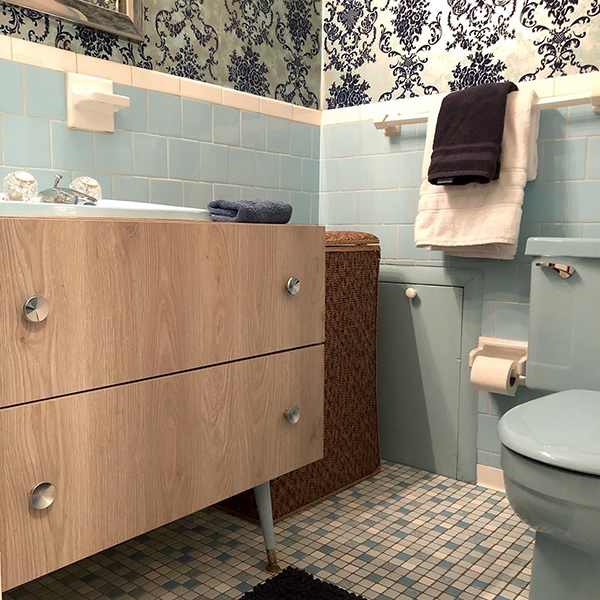Trey is no stranger to our reuse warehouse! He found the blue toilet that was missing from his midcentury bathroom at Community Forklift and paired it with a salvaged vanity and vanity top as well.
The staff and board of directors at Community Forklift are happy to introduce you to our new Executive Director, Trey Davis! Trey is well acquainted with our mission to divert usable materials from the landfill and redistribute them to the community. As a longtime customer at the reuse warehouse, he has himself diverted quite a few salvaged items to his own home over the years!
“Community Forklift is at the intersection of sustainability, construction, and design — three areas that have always been at the center of my professional and personal pursuits,” Trey says. “This is an incredible time to be joining the organization and I look forward to building on the team’s success as we grow our nonprofit’s reach, explore new opportunities, and expand our community engagement.”
Trey has more than 20 years of leadership experience in the land use and nonprofit industries, having most recently served as the Vice President of Membership and Marketing for the Urban Land Institute. He began his career as an urban planner in James City County, VA, and earned an MBA from Georgetown and a BA from Duke University. He has also taught courses on sustainable development.
Trey started in his new role at Community Forklift on February 27, so if you see him out and about in the warehouse during your next visit, say hello! We’re looking forward to the future of our nonprofit, including exploring how to continue supporting the Zero Waste initiatives of local governments, expand our small business incubation for local craftspeople and artists, and increase educational and workspace training programs. Follow us on Instagram, Facebook, or Twitter for updates!
Q&A with Trey
Q: What inspired your interest in reuse and conservation?
A: My father and grandfather were both in construction and always seemed to have a project going on around the house too. As a kid, I got to explore a lot of job sites and help out with weekend projects. Stories about history, design, craft, and technology are embedded in the fabric of buildings, and you can see and touch that when you’re working on them. I learned pretty quickly that even in old buildings, there are elements that have plenty of life left in them. Our resources aren’t infinite, and newer isn’t always necessarily better, so why toss what can be reused?
Buildings also have a tremendous impact on how we experience and identify with our communities. As a teenager, I got involved with the preservation of the train station in my hometown. People from across the area supported the project and shared recollections of life events connected to the depot. That experience led me into urban planning and an abiding interest in small scale development and reuse.
Q: As a Community Forklift customer, what’s your number one tip for a trip to Community Forklift’s reuse warehouse?
A: Come with an open mind and be prepared for some fun surprises! We have a lot of inventory and it changes often, so chances are good you’ll find what you’re looking for. Chances are also good you’ll find a few things you weren’t looking for and didn’t know you needed. I like to do a loop through the whole warehouse just to see what’s there. I almost always see something that sparks new ideas or elicits a “whoa – that’s cool!”.
Q: What are some of your favorite DIY projects that you’ve worked on?
A: Last summer, I built a canoe at Penland School of Craft. We started with plans and a pile of lumber. Two two weeks later, we were paddling our canoes across a lake. Creating something that combines art and function is deeply satisfying. It’s especially fun to do that in a shared workspace where you can trade tips and inspiration with other folks tackling the same challenges.
The bow window on the front of our house was another fun project. It had a number of loose and broken panes and rather than change the character of the house by replacing it with a modern window, I was able to retrofit it with 12 panels of double paned glass. I love projects like that which restore or enhance the unique features of a house that are so often lost in renovations. Finding blue tile and a blue toilet to bring our 1960s bathroom back to its original look was a lot of fun too. (My prediction after a decade of mostly white and gray in interior design: warmth and color are coming back!)
Q: You led the restoration of a historic steam engine for the Virginia Museum of Transportation. How did you become involved in that project?
A: Seeing a locomotive sitting in a museum is one thing. Experiencing one in operation is something else entirely. I was 6 or 7 the first time I saw one pass through my hometown as part of a special excursion program and I was hooked. When the program ended in the 90s, N&W 611 and the other locomotives went back into museums. Twenty years later, when the Virginia Museum of Transportation announced it was exploring the possibility of restoring 611, I volunteered to help and eventually became chairman of the committee leading the effort. With a team of 300 (very dedicated) volunteers, we restored the locomotive, built business plans for its operation, and ultimately operated passenger excursions and special events. Spectators still line the tracks wherever 611 goes, which is just incredible to see. I’m proud to have played a role in making those special experiences accessible for new audiences.
Q: What type of food would you most look forward to seeing at a Community Forklift First Friday event?
A: BBQ pulled pork is a perpetual favorite of mine. I’m from the foothills of the Carolinas where tomato-based sauce is king, but I’m a big fan of the eastern Carolina vinegar-based style too.
***
Every time you donate or shop at Community Forklift, you’re helping us lift up local communities through reuse. We turn the construction waste stream into a resource stream for communities in the DC region – by keeping perfectly good items out of the landfill, preserving historical materials, providing low-cost building supplies, and creating local green jobs.



